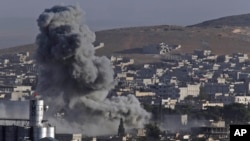Fighting raged on Friday in the Syrian Kurdish city of Kobani near the Turkish border, with Syrian Kurdish leaders saying key government buildings have fallen to Islamic State forces.
Kurdish sources on the Turkish side of the border say the Islamic State has control of the court house, police headquarters and the main municipal building. Anwar Muslim, head of the Kobani Council, said the Islamic State is in control of half of the city, including Kurdish defense forces headquarters.
Ashya Abdullah, co-chair of a prominent Syrian-Kurdish political party (PYD) told VOA's Kurdish service from Kobani there is "very, very intense fighting" in two parts of the city.
Kurdish fighters are trying to halt a three-week offensive by the Islamic State on the strategic border city, as militants aim to take complete control of the area.
Dire consequences
The U.N. envoy to Syria, Staffan de Mistura, said Friday that thousands of people most likely will be massacred if Kobani falls to Islamic State fighters. He said there are 700 elderly civilians trapped in the city, as well as about 12,000 people who have left the city center but can not get to the border with Turkey.
The U.S. military continued carrying out air strikes on Islamic State targets in Kobani on Friday, firing at sites much closer to the center of the city, especially in areas close to the Turkish border. The attacks targeted Islamist training sites, tanks and vehicles.
The British based group, Syrian Observatory for Human Rights, says Islamic State fighters are now in control of 40 percent of Kobani.
The U.S. State Department said Friday that Turkey has agreed to help train and equip moderate opposition groups in Syria. Spokeswoman Marie Harf said U.S. Department of Defense officials will travel to Turkey next week to discuss the matter.
"Turkey has agreed to support training and equip efforts for the moderate Syrian opposition. There will be a DoD [Department of Defense] planning team traveling to Ankara next week to continue planning that through military channels," she said.
Turkey has deployed troops at its border, but has said it will not join the fight despite U.S. pressure to do so.
Kurdish control
U.S. defense officials said on Thursday that Kurdish militias remain in control of "most of the city," known also as Ayn al-Arab, and are resisting a takeover by Islamic State militants.
Kobani’s defense chief, Ismet Hasan told VOA the Kurdish People’s Protection Units, known as the YPG, held off the militant group in fierce clashes overnight.
He added that the IS group is receiving reinforcements from the Syrian cities of Aleppo and Raqqa.
“For 25 days we have been resisting the IS with light weapons, but with the full determination of YPG fighters and the people of Kobani. We will continue resisting against IS terrorists but we need heavy weapons. If the U.S. can provide us weapons that are capable of eliminating their heavy weapons, like tanks and artillery, and continue air strikes against [the IS], we are confident we will be able to kill them all,” stated Hasan.
After much of the local population sought refuge in Turkey, Kurdish fighters rallied to defend the city and asked for international support.
The U.N. envoy to Syria, Staffan de Mistura, urged Turkey to let "volunteers" (Kurds) cross the border so they can reinforce Kurdish militias defending the city. He warned that 700 civilians who remain trapped in Kobani, plus about 12,000 gathered nearby, will most likely be "massacred" if the city falls to the Islamists.
Turkey's President Recep Tayyip Erdogan said on Friday he will not give in to street protesters demanding his government do more to protect Kurds. He questioned supporting a Syrian regime that he said has killed about 250,000 people, and he criticized neighboring Muslim countries that do so.
With the threat of Kobani falling to the Islamic State, Turkey is experiencing violent street protests led by its Kurdish minority who say Turkey's government is failing to intervene. Police have used tear gas to break up many of the protests.
Swaying Turkey
U.S. and NATO officials on Thursday held talks in Ankara aimed at convincing Turkey to make a greater contribution to the global anti-Islamic State coalition.
Turkish Foreign Minister Mevlut Cavusoglu said Thursday at a joint news conference with NATO Secretary-General Jens Stoltenberg that discussions about Turkey's contributions to fighting the militants are ongoing.
Turkey's parliament has authorized military action in Syria and Iraq, but Turkish forces have not carried out any actions against the militants.
Stoltenberg said the Islamic State group poses a threat to Syria, Iraq, Turkey and to NATO nations. "So it is important that the whole international community stays united in this long-term effort. I welcome the decisive actions taken by the United States with many allies and partners and I welcome the recent vote in the Turkish parliament to authorize an even more active role of Turkey in the crisis," he said.
He also said a no-fly zone or buffer zone in the region is not yet under consideration.
Material for this report came from AP and AFP.











